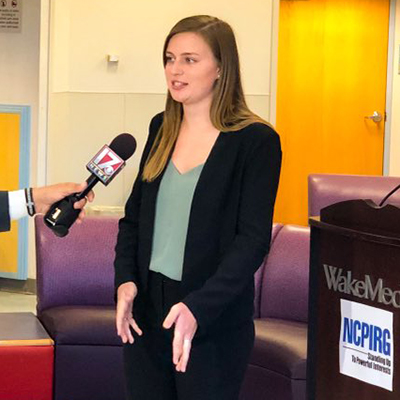
Katie Craig
State Director, NCPIRG Education Fund
There are a lot of questions out there about recycling right now, so this America Recycles Day we interviewed a recycling expert to get the latest scoop.
State Director, NCPIRG Education Fund
It’s no secret that our country has a waste problem. So, this America Recycles Day, we are exploring the role recycling can play to help move us towards a cleaner, healthier, future beyond waste. To do this we interviewed recycling expert and Executive Director of Carolina Recycling Association, Mary McClellan, to get the latest scoop on recycling in North Carolina.
She says, if you are recycling the right things, they are getting recycled and you should absolutely keep at it. But, she says, it’s still going to take more than recycling to solve our waste problems and that this is just one tool in the toolbox that we need to activate.
Check out the interview to hear more about the state of recycling in North Carolina, what should go in your bin, what happens to your items after you toss them, and more.
NCPIRG Education Fund State Director, Katie Craig, interviews Mary McClellan of the Carolina Recycling Association.
Short answer, it varies community to community. But there are some things that are accepted by almost all recycling facilities, including:
Other items that may be accepted in some places include:
And lastly, there are some items that are almost never accepted and should not go into your recycling bin:
Sometimes. Bottles, jugs, and jars are most consistently recyclable, but other plastic items such as plastic cups, utensils, and straws are rarely accepted if at all.
Because of this, many single-use plastic items require a solution beyond recycling to address our plastic waste problem.
Step 1: You place a recyclable item into your recycling bin and roll it out to the curb
Step 2: Your recyclables are taken to a materials recovery facility (also known as a “MRF”). At that facility, the recyclables will be sorted using a mix of machines and manual processes.
Step 3: A manufacturer buys the cleaned & sorted materials they want to use.
Step 4: The manufacturer uses the recovered material to make a new product. Sometimes these products will be the same as the original item recovered, for example many cans will be turned back into a new can. Other times, these materials will be used to create a new type of product, such as a plastic bottle being used to create carpeting fiber or a new sneaker.
Step 5: Those item go on the store shelf where you can buy it again.
Recycling and recycled products are one piece of the puzzle to reduce waste and move towards a more circular economy. But because many materials are not made to be recycled from the start, we can’t recycle our way out of our waste and plastic pollution problems. We need to make full use of both recycling and zero waste alternatives to put our planet and health over plastic waste.
So, this America Recycles Day, we also challenge folks to remember the other pieces of the equation too, reduce and reuse. The less unnecessary or unrecyclable materials end up in our recycling systems, the more we can recycle more efficiently and economically. As laid out in our report, Trash in America, a great first step towards a zero-waste economy can be eliminating those hard to recycle plastics, from bags, to foam and other takeout food ware, both through individual and policy actions.
So, happy America Recycles Day and as CRA’s Mary McClellan says “don’t be discouraged, keep recycling, it is working. And it is the right thing to do for the planet, for the economy, and for society” and also don’t forget to reduce and reuse too.
We're standing up to powerful interests, but we need your support to make it possible.
Donate
State Director, NCPIRG Education Fund
Katie directs NCPIRG's statewide campaign strategy, organizational development, research, communication and legislative advocacy efforts. Katie was born and raised in Raleigh, North Carolina, and continues to live there now. When she’s not working, Katie enjoys traveling and spending time with friends and family.